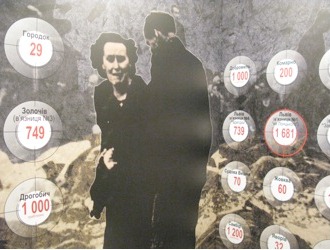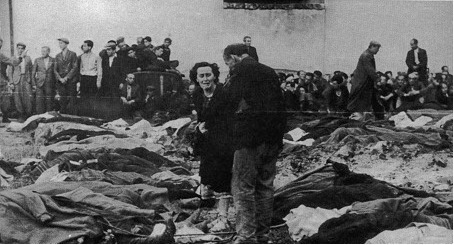O P I N I O N
by Per Anders Rudling
Last week, a Canada-wide lecture tour by Ruslan Zabily was announced. He is the former director of the Center for the Study of the Liberation Movement and the current director of the Lonsky Street Prison National Memorial Museum (for short: the Lonsky Museum) in Lviv, Ukraine.

AT THE LONSKY MUSEUM: JEWISH HOLOCAUST VICTIMS PHOTOSHOPPED OUT. A woman has just recognized a loved one among the victims of the NKVD killings in 1941. In the background of the original photo one also sees groups of Jewish victims of the massacre which followed within days of the NKVD murders (Jews were forced to carry and rebury these victims). Thousands of Jews were killed as Soviet crimes were blamed on them and used to incite antisemitic violence and murder. In this photoshopped version on display at the Lonsky Museum, the nationalists’ Jewish civilian victims are literally covered by the circular insertions of Soviet crime statistics, implicitly ethniziced as Ukrainian suffering.
◊

The original image, before photoshopping at the Lonsky…
The lecture tour includes some of the most prestigious universities in Canada — the universities of Alberta, Toronto, Manitoba, Saskatchewan, and Ottawa — as well as Harvard University’s Ukrainian Studies Institute in the United States. The lectures in Alberta and Toronto are facilitated by the Canadian Institute of Ukrainian Studies; the Peter Jacyk Program for the Study of Ukraine; the Centre for European, Russian and Eurasian Studies; the Harvard Institute of Ukrainian Studies and its Chair of Ukrainian Studies.
RELATED:
Dr. Rudling’s original 3 October email
Letter of complaint sent by ultranationalist organizations to the vice-chancellor of Lund University
Sections on Ukraine and Canada; older Canada chronicle page
According to the website of the League of Ukrainian Canadians (LUC), Zabily’s lecture tour has been organized by the Canadian Conference in Support of Ukraine, consisting of the League of Ukrainian Canadians, its women’s branch known as the League of Ukrainian Canadian Women, and its youth section, the Ukrainian Youth Association of Canada (SUM/CYM); the paper Homin Ukrainy, which is considered close to Bandera-type nationalism; and the Society of Veterans of UPA, under the patronage of the Ukrainian Canadian Congress. The Canadian Conference in Support of Ukraine is in turn linked to the International Conference in Support of Ukraine. Its chair, Askold Lozynskyj has described convicted Sobibor camp guard John Demjanjuk as a “martyr,” [1] alleged special Jewish influence in the Canadian media, alleging that an “overwhelming amount of Soviet accomplices during the Soviet’s two years in western Ukraine from 1939-41 were Jews”[2]. He has moreover dismissed emerging scholarship on the Holocaust in Ukraine by presenting research funding by the Unites States Holocaust Memorial Museum as “renumeration” for “producing one or two demons.”[3]
In general, several of the associations organizing this lecture tour are associated with Ukrainian nationalism on the pattern of the far-right wing of the Organization of Ukrainian Nationalists, named after its leader Stephan Bandera. Anti-democratic, antisemitic, racist, and violent for decades, the OUN(b) employed terrorism and political violence against political opponents and national minorities, especially but not only during World War Two.
Nationalism as inspired by Bandera seems to continue to exert considerable influence. There remains a cult of personality of Bandera and other violent nationalist leaders. The historical reality of nationalist involvement in the Holocaust, the ethnic cleansing of Polish civilians, and the killing of Ukrainians of different views and allegiances is often vehemently denied or relativized away.
The lecturer, Ruslan Zabily, became widely known when he was harassed by Ukrainian authorities. An international letter of protest was signed by a large number of scholars, including the author of this article. Many signatories, however, insisted explicitly that they defended Zabily’s right not to be harassed for historical research only as a matter of principle, while strongly rejecting his involvement in nationalist apologetics and nationalist history activism. Now Zabily is presented as a victim of state harassment only; the deeply problematic nature of his work is omitted; his audience may often not even be aware of how controversial it is. Such an approach at least looks like “spin” and a selectiveness intended to achieve publicity aims.
I object to this implicit misuse of my protest.
In purely academic terms, for such a substantial lecture tour, Zabily’s credentials are astonishingly modest. He holds the equivalent of a masters degree and his publication record, assessed by the usual and commonly accepted criteria of peer review etc, is extremely slim.
This reinforces the unfortunate impression that this lecture tour is a political event and not an academic one and should not receive the academic institutional legitimacy it somehow has automatically been awarded. Zabily has been involved in the uncritical promotion and even glorification of Ukrainian World War Two Nationalism. For instance, the museum he now directs in Lviv is housed in the facilities of an infamous former prison where inmates were massacred by the Soviet NKVD in June 1941.
The museum commemorates these killings and other repressions and atrocities by Soviet agencies but passes over in striking silence the mass pogroms carried out, with German but also local and Ukrainian nationalist involvement, at, among other places, precisely the same location only days later.
Jewish suffering is omitted. Perpetrators of anti-Jewish violence are not named. This omission is all the odder since the Lviv pogroms of 1941 are by now comparatively well researched; they were no exception but part of a wider, regional wave of anti-Jewish violence, where German, local-nationalist, and, to one degree or another, popular perpetrators struck together. The museum under Zabily’s direction glosses over this history.
Ruslan Zabilyi’s lecture tour culminates in an LUC/SUM event dedicated to the celebration of the Ukrainian Insurgent Army (UPA) commemorating a celebration of a fictitious 70th anniversary, and, believe it or not, a meeting with Canadian Prime Minister Stephen Harper.
◊
The hosting of Ruslan Zabily by reputable academic institutions is deeply worrying. It should now serve as a call to rethink some aspects of Ukrainian studies. Careful, differentiated, and academically viable inquiry leaves ample room for differences and substantial disagreement, also when politically motivated. Yet it cannot “peacefully co-exist” with — and even, intentionally or not, assist in — the glorification of a violent ethno-nationalist legacy and the obfuscation or omission of its brutality.
Pluralism requires responsibility and academia needs to uphold standards. Ruslan Zabily has every right to free expression; he has no right to what amounts to academic endorsement, except as he would earn it by ordinary academic credentials and academically viable and peer-reviewed research. Both are still in the future.
Moreover, his involvement in glorifying nationalism at its most brutal should make every institution, academic and non-academic, strive for a maximum level of discernment when considering in what form to engage with his views. A lecture tour presenting him only as a victim of political harassment is a deeply mistaken approach.
[1] Askold Lozynskyj, “A eulogy for John Demjanjuk” in Kyiv Post, 22 March 2012, http://www.kyivpost.com/opinion/op-ed/a-eulogy-for-john-demjanjuk-2-124728.html
[2] Askold Lozynskyj, “How insensitive bigots continue to play Ukrainians and Jews against each other” in Kyiv Post, 8 November 2010, http://www.kyivpost.com/opinion/op-ed/how-insensitive-bigots-continue-to-play-ukrainians-89252.html
[3] Askold Lozynskyj, “Rewriting history: And evidentiary perspective” in Kyiv Post, 16 February 2010, http://www.kyivpost.com/opinion/op-ed/rewriting-history-an-evidentiary-perspective-59650.html
Dr. Per Anders Rudling is a postdoctoral research fellow at Lund University, Sweden, in the Faculty of Humanities and Theology. A number of his papers are available here.